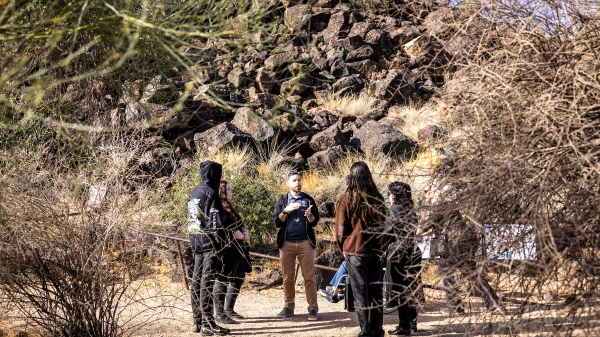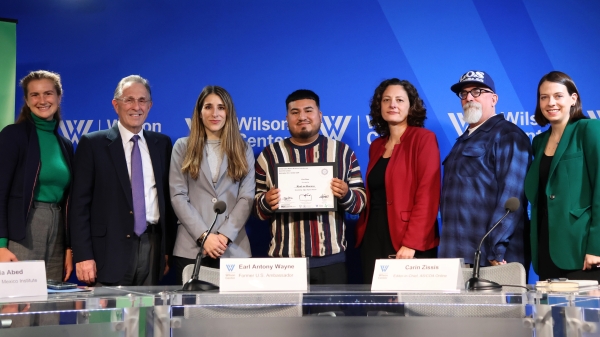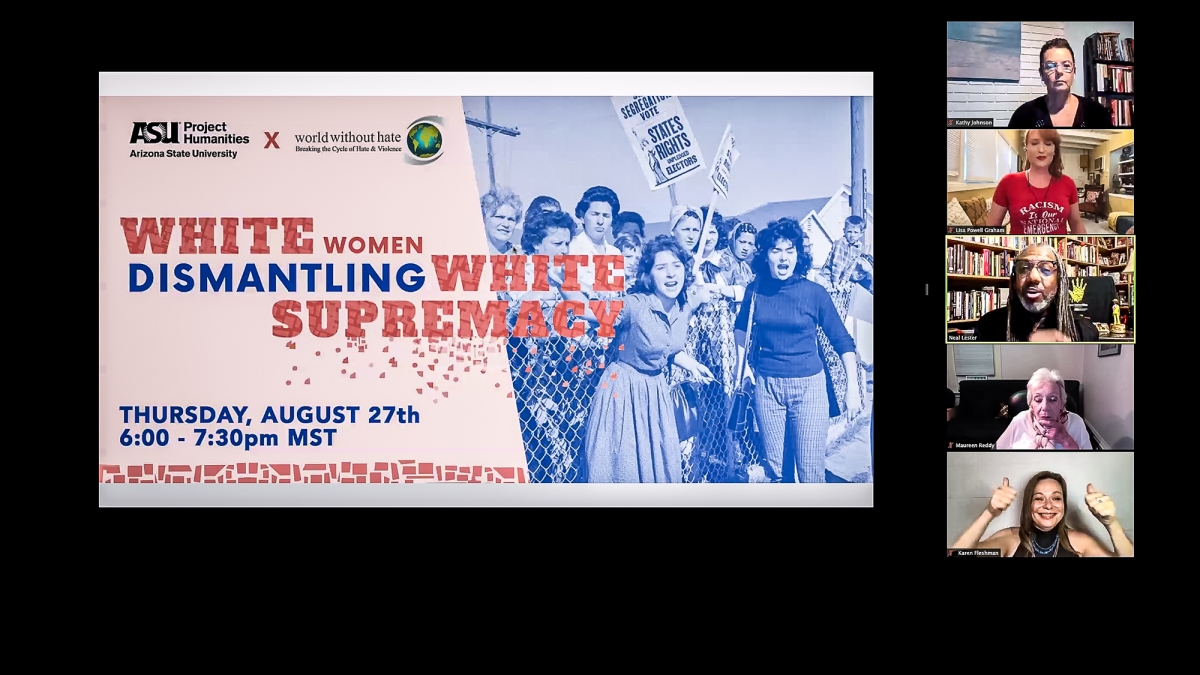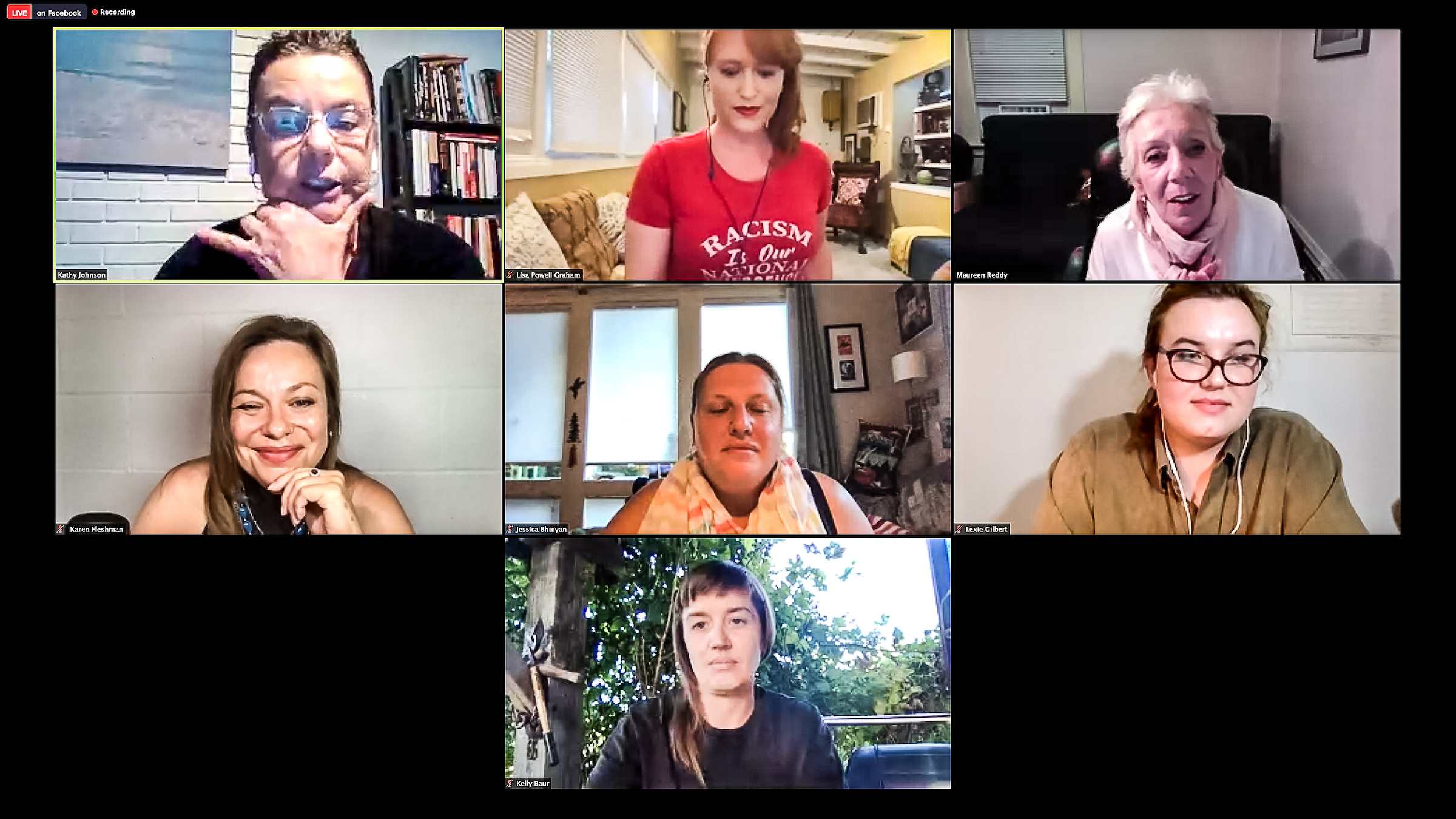White women have historically played a curious role in race relations in America, occupying dual roles as oppressor and the oppressed.
While they benefit from racial privilege, they still suffer from the patriarchy inherent in systems of white supremacy.
“Our role for 400 years has been to raise white children and help them develop the same set of beliefs of our heirs, and police and maintain the social hierarchy,” Karen Fleshman said in an Aug. 27 livestream event “White Women Dismantling White Supremacy,” hosted by Arizona State University’s Project Humanities. “To dismantle it, we have to extricate ourselves from the patriarchy and stop perpetuating those harmful beliefs and behaviors, and we have to exercise the intergenerational trauma that we carry from what our (white) forebears inflicted on other people.”
Fleshman is the founder of a workplace-workshop facilitation company based in San Francisco. She was one of six panelists in the virtual event, which drew more than 600 registrants from the United States, Canada and Australia.
In addition to Fleshman, panelists were Kathy Shaw Johnson, an ASU alumna with degrees in African American studies and sociology; Lisa Powell Graham, a TEDx speaker, writer and life coach; Jessica Bhuiyan, community leader, volunteer and executive director of World Without Hate, a Seattle-based nonprofit; Kelly Baur, a documentary filmmaker, community organizer and ASU PhD student; and Lexie Gilbert, a doctoral student in linguistics and applied linguistics and a teaching associate with the writing programs at ASU. Maureen T. Reddy, a professor of English and gender studies at Rhode Island College, served as panel moderator.
Panelists for "White Women Dismantling White Supremacy" included Kathy Shaw Johnson (top left); Lisa Powell Graham (top middle); Maureen Reddy (top right); Karen Fleshman (middle left); Jessica Bhuiyan (middle center); Lexie Gilbert (middle right) and Kelly Baur (bottom row). Screenshot by Charlie Leight/ASU Now
The event was the second installment of Project Humanities’ fall 2020 event lineup and part of its ongoing campaign, “Humanity 101: Creating a Movement.”
“Project Humanities continues to respond to ‘the urgency of now’ with events and programs that focus on our fundamental humanity and that of others, fully recognizing humanity at the core of any and all justice and equity work,” said Neal A. Lester, professor of English and director of Project Humanities. “Against the backdrop of COVID-19 uncertainties and this summer’s global crisis in racial justice, our current virtual programs invite and challenge participants across the nation and globe to ‘talk, listen and connect’ with us around topics that affect all of us in one way or another — from environmental justice to the economics of U.S. racism, to the uses and responses to anger and white women’s unique role in dismantling white supremacy.”
Dismantling white supremacy and social hierarchies that perpetuate inequality can include changing one’s behavior, listening to others — and even social revolution.
Before the panel spoke, Baur shared a metaphor she uses often for understanding white women’s role in complicity.
“White women’s role in white supremacy is that we are the hand … that of the fist,” Baur said. “What’s the difference between the hand and the fist? It’s just the tension. It’s just the clenching.”
Bhuiyan said many white people have a hard time believing they’re racist and that you often have to start from zero to get them to understand how deep it goes.
“Many people believe we don’t have any racism here in the Pacific Northwest and obviously, that couldn’t be further from the truth,” Bhuiyan said. “I’m middle-aged and I’ve learned things yesterday that I had no idea existed. And I’m meeting with folks in their 50s, 60s and 70s and not only do they want to change, but they’re still confused. I try to remind them, ‘This is where I was, too.’ Once we get there, then we must ask what are the actions that we can start taking from that point on?”
Graham said that white women have maintained racist and white supremacist power structures for centuries, including calling the police on Black people and voting for candidates who divide the country.
She added: “I believe my role is as an ally attempting to be an accomplice. I need to be willing to risk my reputation, my career, my platform, losing likes, losing followers, losing dollars. We have to put ourselves on the line and be willing to speak out and take action.”
Academia and education should be the place to start changing minds, Fleshman said.
“Black lives are more important than white feelings, and I think that’s a statement that we all need to stand behind,” she said. “Education is definitely a starting place. Black people are dying, and white women form book clubs. We need to listen and learn from people of color.”
Gilbert said it will take nothing short of a social revolution to change behaviors when it comes to race.
“I think we underestimate the extent to which white supremacy as a system of organization can move around and adjust for whatever conditions it needs to be,” Gilbert said. “So for me, it’s revolution or bust. It’s abolition or bust. It’s no more prisons, no more police, no more detention camps, decolonization of the lands … white people shouldn’t be determining what it means to be accountable.”
Fleshman said demographics in this country are rapidly changing. She said millennials have now surpassed baby boomers in the workforce and that the majority of the United States will be people of color by 2040.
“I’ve never seen a generation of white Americans with as much to gain from dismantling white supremacy as white millennials because of the cost of mass incarceration, the impact of the subprime mortgage, job prospects, student loans,” Fleshman said. “I’m hoping that white millennials will stand up and become leaders ... and transform the whole system.”
In addition to leadership, Bhuiyan said another trait was desperately needed — empathy.
“Whether you are a progressive in Seattle or if you are in a red state down south, just try and have empathy,” Bhuiyan said. “I want everyone here and beyond, not just those on the panel, to really think about the fact that our country needs an empathy revolution.”
Project Humanities’ 2020 fall lineup will continue through November and will examine racism, gender identities, anger, anti-speciesism, co-parenting and environmental justice.
All events are open and free to the public. Like most other programming at ASU, Project Humanities transitioned to virtual events because of COVID-19.

Humanity 101 Creating a Movement:
6 p.m. Sept. 8 — Money Matters: The Economics of Racism
6 p.m. Sept. 17 — Podcast Club: Gender Binary
6 p.m. Sept. 29 — Vital Voices: “The Uses of Anger”
Oct. 9–11 — Hacks for Humanity: Hacking for the Social Good
6 p.m. Oct. 22 — Humanity 101 On The Homefront: Co-Parenting
6 p.m. Oct. 29 — Podcast Club: Anti-Speciesism
6 p.m. Nov. 5 — Environmental Justice: Indigenous Communities
6 p.m. Nov. 12 — Podcast Club: TBD
Top image: Screenshot from the live Zoom event, "White Women Dismantling White Supremacy." Screenshot by Charlie Leight/ASU Now
More Arts, humanities and education

Petroglyph preserve celebrates 30th anniversary with ancient, modern tales
The Deer Valley Petroglyph Preserve provides a beautiful walk through a pristine desert where chuckwalla lizards are as plentiful as the cacti that comes in many shapes and sizes.It’s also a step…

Kaleidoscope short film contest inspires powerful binational filmmaking in its second year
“We come to this country not to steal anybody’s jobs but to take advantage of the opportunities that the rest ignore. We’ve been taking care of the American soil for many years. But our hands will…

ASU's Neal Lester reflects on life, death of poet Nikki Giovanni
When Neal Lester heard on Monday that poet and activist Nikki Giovanni had died, the news hit hard.Lester, the founding director of Arizona State University’s Project Humanities and a Foundation…

